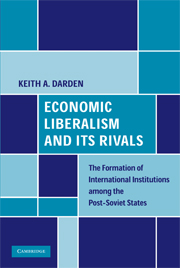 Economic Liberalism and Its Rivals
Economic Liberalism and Its Rivals Book contents
- Frontmatter
- Contents
- List of Figures and Tables
- Acknowledgments
- PART ONE THEORY AND METHODOLOGY
- PART TWO CONTINGENT SELECTION AND SYSTEMATIC EFFECTS: COUNTRY-LEVEL ANALYSES OF ELITE SELECTION, IDEATIONAL CHANGE, AND INSTITUTIONAL CHOICE, 1991–2000
- PART THREE COMPARING CASES
- Appendix A Measurement and Coding of Economic Ideas – Additional Tests
- Appendix B Interviews Conducted by the Author
- Bibliography
- Index
PART TWO - CONTINGENT SELECTION AND SYSTEMATIC EFFECTS: COUNTRY-LEVEL ANALYSES OF ELITE SELECTION, IDEATIONAL CHANGE, AND INSTITUTIONAL CHOICE, 1991–2000
Published online by Cambridge University Press: 29 July 2009
- Frontmatter
- Contents
- List of Figures and Tables
- Acknowledgments
- PART ONE THEORY AND METHODOLOGY
- PART TWO CONTINGENT SELECTION AND SYSTEMATIC EFFECTS: COUNTRY-LEVEL ANALYSES OF ELITE SELECTION, IDEATIONAL CHANGE, AND INSTITUTIONAL CHOICE, 1991–2000
- PART THREE COMPARING CASES
- Appendix A Measurement and Coding of Economic Ideas – Additional Tests
- Appendix B Interviews Conducted by the Author
- Bibliography
- Index
Summary
The next four chapters chart the changes in economic ideas in each of the 15 post-Soviet states over the first 10 years of their independence, and their purpose is to demonstrate contingency in the selection of ideas and the systematic effects of officials' ideas on policy and institutional choice. To do this, the chapters trace the leadership changes in each country during the 1990s, identify the economic ideas prevalent in each of the governments, and show how these ideas manifest in each country's choice of international trade institutions, as well as macroeconomic, privatization, and energy policies. To make the case for contingency, the chapters highlight the idiosyncratic, nonsystematic factors determining the selection of economic ideas – and hence the exogeneity of those ideas. Second, they show the systematic effect of economic ideas on political preferences and institutional choice. Before moving to the empirical studies, let us briefly examine the logic of the argument and the methods used for making this case in the post-Soviet context.
THE CASE FOR CONTINGENCY OF SELECTION
As noted in Chapter 1, contingency is inherently a part of ideational selection. In the post-Soviet states in particular, the contingency of idea selection was heightened by a combination of political institutions that gave individual leaders a great deal of authority, as well as idiosyncratic features of the process by which the region's leaders came to power and by which they came to hold their ideas.
- Type
- Chapter
- Information
- Economic Liberalism and Its RivalsThe Formation of International Institutions among the Post-Soviet States, pp. 119 - 124Publisher: Cambridge University PressPrint publication year: 2009


